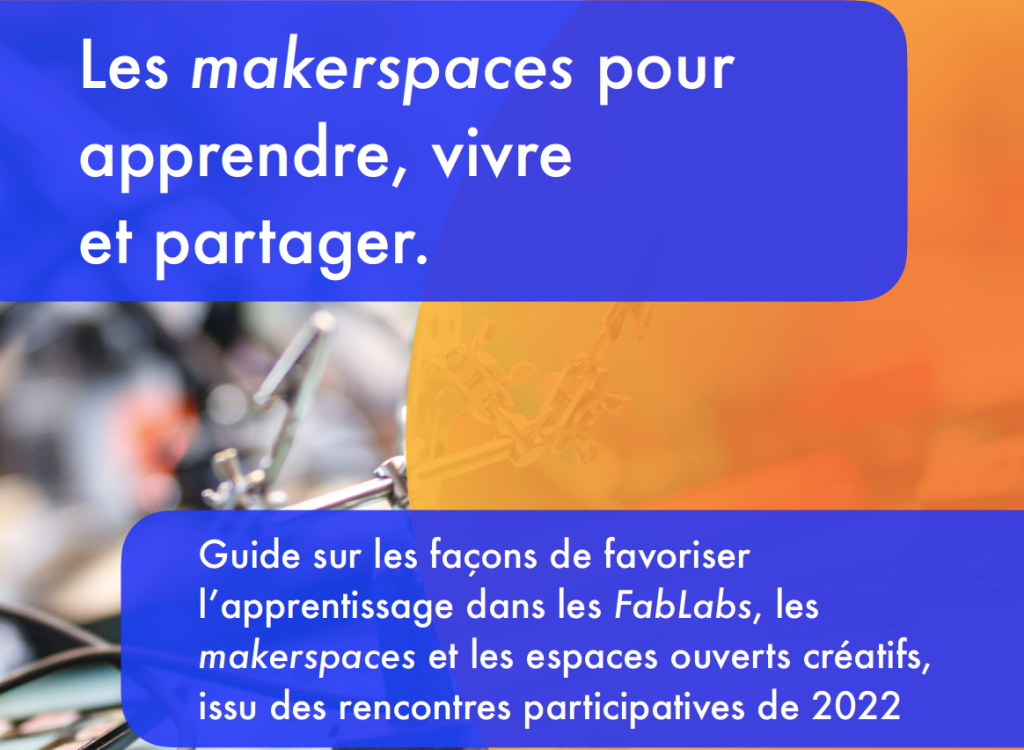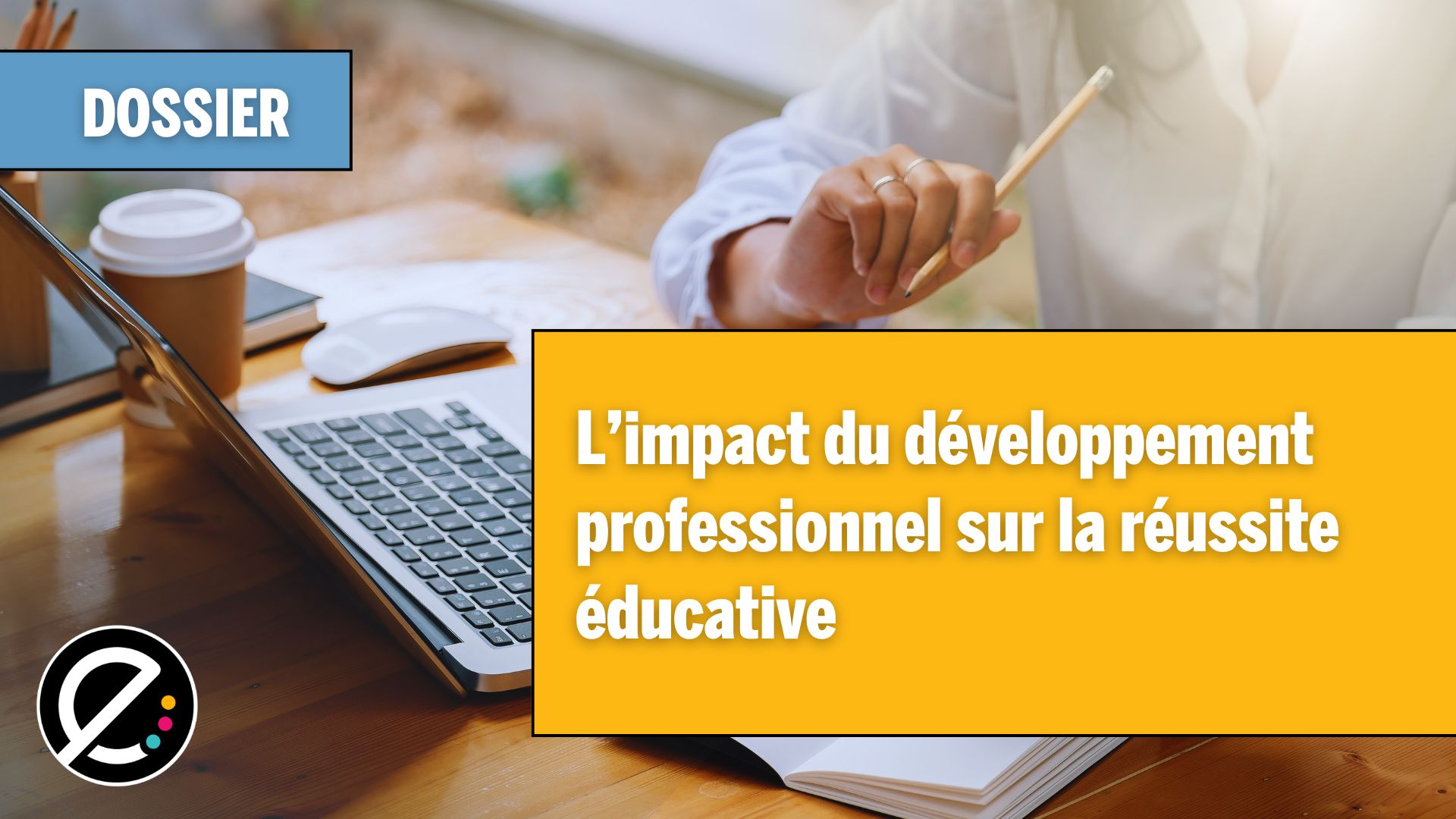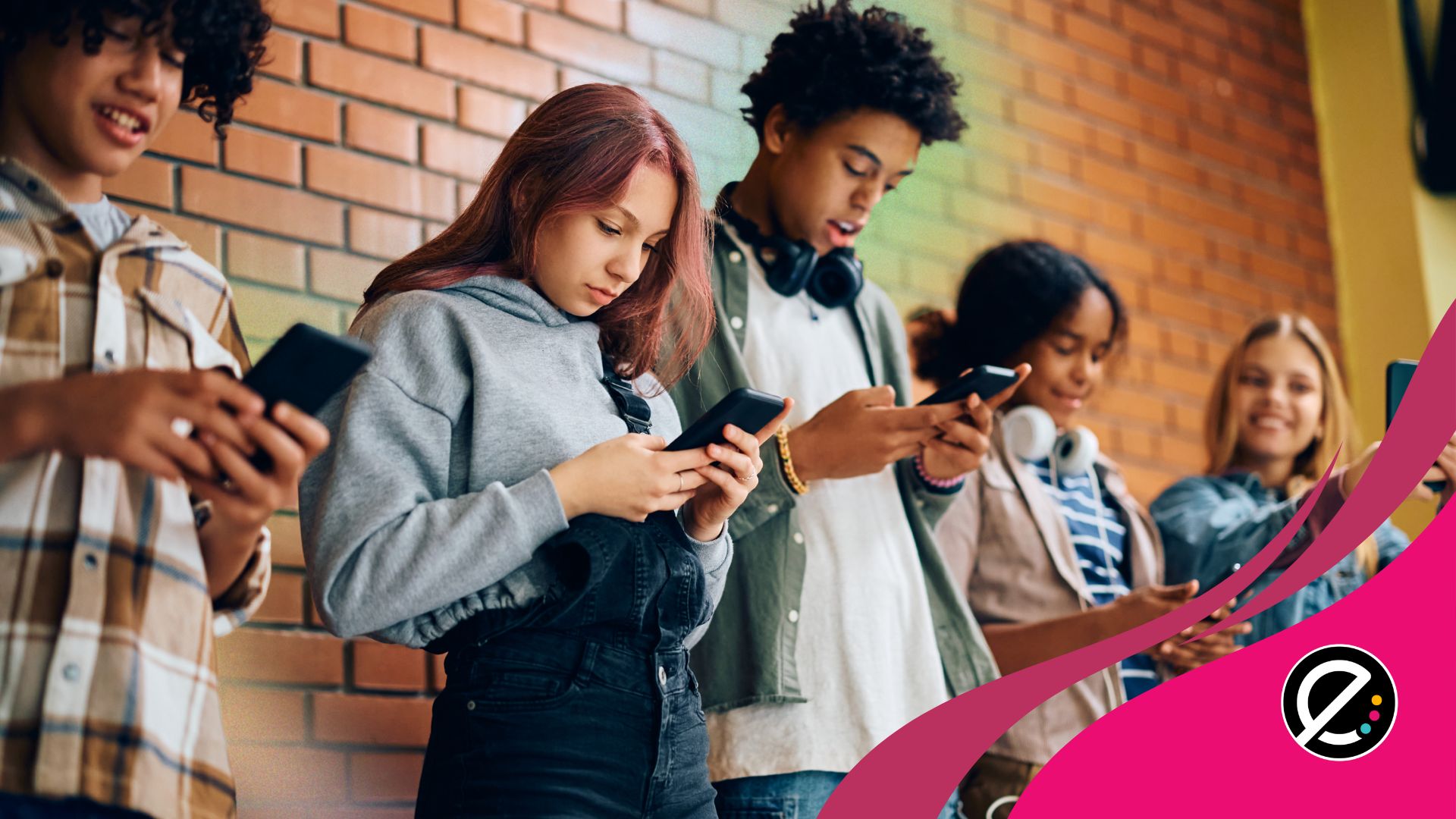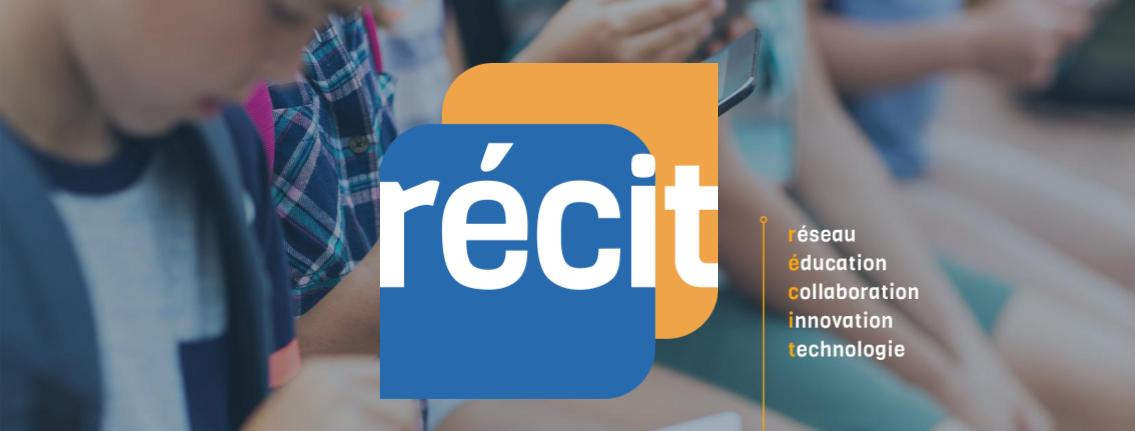Au printemps 2022, des événements unconference (de style edcamp) sur la facilitation des apprentissages dans les makerspaces, les Fab Labs et les laboratoires créatifs se sont tenus virtuellement. Plus de 80 personnes ont contribué activement aux discussions. Un guide pratique, résumant les échanges et offrant des clés à quiconque souhaite créer un laboratoire créatif, vient d’être rendu public. La version PDF est offerte en exclusivité sur le site de l’École branchée.
(English version follows…)
Ajout du 8 mai 2023 : guide en français
Le guide « Makerspaces for Learning, Living & Sharing » est maintenant disponible en français et anglais. La version en français a été dévoilée officiellement à l’occasion du 90e Colloque de l’Acfas.
Puisque la majorité des discussions des Unconferences se sont déroulées en anglais, le guide avait d’abord été lancé en anglais en janvier. La plupart des participants étaient du Québec, mais au fur et à mesure que les événements se déroulaient et étaient partagés en ligne, de nouveaux participants se sont joints en provenance d’autres provinces canadiennes, des États-Unis, du Royaume-Uni et de l’Afrique.
Les événements du printemps 2022 ont été organisés sous le leadership d’Ann-Louise Davidson (Université Concordia), de Nadia Naffi (Université Laval) avec la participation de trois étudiants : Nathalie Duponsel, Houda Jawhar et Geneviève Lamarche. Le guide a été conçu par Don Undeen, également étudiant.
En tout, ce sont sept événements qui ont eu lieu dans le cadre d’une collaboration entre le Laboratoire d’innovation de l’Université Concordia, le Musée de la civilisation de Québec et l’Institut Milieux pour l’art, la culture et la technologie.
Les thèmes suivants ont été abordés :
- Les apprentissages de la COVID-19, quoi faire quand les makerspaces* sont fermés
- Créer un réseau entre les makerspaces
- Préparer les facilitateurs des makerspaces
- Engagement communautaire et cycle de vie des makerspaces
- Le mouvement « maker » dans les lieux d’enseignement formels
- Les trousses « maker »
Des balados bilingues avaient été créées en amont pour chacune des thématiques et sont toujours disponibles sur le site Web du projet.
Un guide pratique pour tous
Afin de garder des traces des échanges et de diffuser les connaissances partagées au cours des événements au plus grand nombre, l’équipe de recherche a travaillé à la conception d’un « Playbook », un guide pratique d’une centaine de pages qui se veut accessible à tous.
Chaque section est présentée sous la forme d’un question-réponse et offre des exemples, des témoignages, des listes à cocher et des idées très concrètes qui peuvent être facilement repris par quiconque souhaite créer un makerspace, un FabLab ou un espace créatif ouvert.
Parmi les questions :
- Quelles sont les compétences nécessaires aux faciltateurs des makerspaces?
- Comment faire connaître son makerspace dans la communauté?
- Comme enseignant, comment puis-je me préparer à expérimenter le makerspace avec mes élèves?
- Que devrait contenir une trousse maker?
Chaque section contient également des espaces avec des éléments de planification que le lecteur peut compléter lui-même afin d’alimenter sa réflexion au fur et à mesure qu’il parcoure le guide. Celui-ci peut être lu d’une page à l’autre. Le lecteur a aussi le loisir de butiner d’une section à l’autre en fonction de ses intérêts.
Ce projet a été rendu possible grâce au soutien d’une subvention Connexions du Conseil de recherches en sciences humaines du Canada et la collaboration du Musée de la civilisation (Québec).
* L’équipe du projet a opté pour garder les termes « makers » et « makerspaces » en français, puisque les expressions « laboratoire créatif » et « usagers des laboratoires créatifs » ne représente pas bien l’esprit maker. Celui-ci faisant davantage référence à l’aspect fabrication du mouvement « maker ».
Télécharger le « Playbook »
« Makerspaces for Learning, Living & Sharing » (en anglais)
« Les makerspaces pour apprendre, vivre et partager. » (en français)
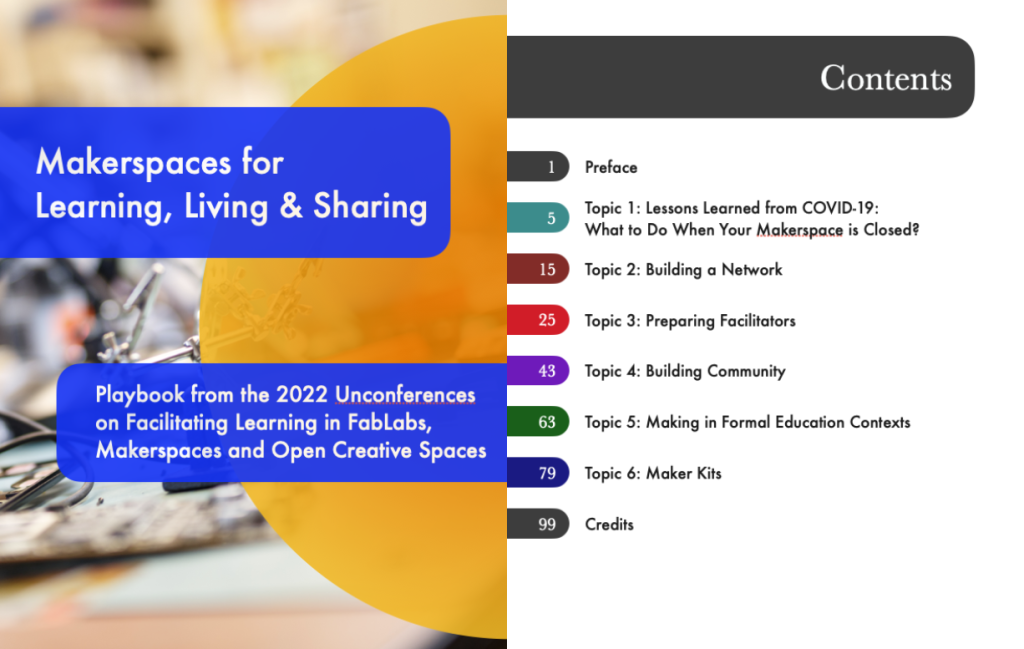
Makerspaces for Learning, Living & Sharing : a playbook now available
During the Winter 2022, the Education Makers research team held virtual unconference events (edcamp-style) on facilitating learning in makerspaces, Fab Labs, and creative labs. Over 80 people actively contributed to the discussions. A practical guide, summarizing the discussions and offering tips to anyone who wants to maintain, revive or launch a makerspace, has just been released. The PDF version is available exclusively on the École branchée website.
The playbook “Makerspaces for Learning, Living & Sharing” was first available in English and later released in French. Since most of the discussions at the Unconferences were held in English, it was quicker to write the first version in English. Most of the participants were from Quebec, but as the events unfolded and were shared online, new participants joined from other Canadian provinces, the United States, the United Kingdom and Africa.
The winter 2022 events were organized under the leadership of Ann-Louise Davidson (Concordia University), Nadia Naffi (Laval University) with the participation of three students: Nathalie Duponsel, Houda Jawhar and Geneviève Lamarche. The guide was designed by Don Undeen, also a student.
Seven events took place as part of a collaboration between Concordia University’s Innovation Lab, the Musée de la civilisation de Québec and the Institute Milieux pour l’art, la culture et la technologie.
The following topics were discussed:
- COVID-19 learnings, what to do when makerspaces are closed
- Creating a network of makerspaces
- Preparing makerspaces facilitators
- Community engagement and sustainability of makerspace
- Making in formal education
- Maker Kits
Bilingual podcasts were created in advance for each theme and are still available on the project website.
A practical guide for everyone
In order to keep track of the discussions and disseminate the knowledge shared during the events to as many people as possible, the research team worked on the design of a “Playbook”, a practical guide of about 100 pages that is meant to be freely accessible to everyone.
Each section is presented in a question-and-answer format and offers examples, testimonials, checklists, and very concrete ideas that can be easily picked up by anyone interested in creating a makerspace, FabLab, or open creative space.
Among the questions:
- What skills are required by makerspace facilitators?
- How do I get the word out about my makerspace in the community?
- As a teacher, how can I prepare to experience the makerspace with my students?
- What should a makerspace kit contain?
Each section also contains spaces with planning elements that the reader can complete on their own to fuel their thinking as they go through the guide. The guide can be read from page to page. The reader can also browse from one section to another according to their own interests.
This project was made possible with the support of a Social Sciences and Humanities Research Council of Canada Connections Grant program and the collaboration of the Musée de la civilisation (Québec).



